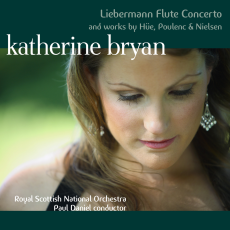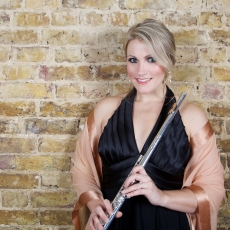Katherine Bryan - Liebermann Flute Concerto - Audio Video Club of Atlanta
Katherine Bryan is a marvel. In a program of three 20th century flute classics - and one that ought to be a classic - she shows amazing breath control, a real bravura presence in fast-running, exciting passages that doesn't let us down in the quieter, more intimate ones, and an ability to soar with the orchestra or play against it, using it as antagonist or backdrop, depending on the needs of the music. The British artist who studied at Juilliard with Carol Wincenc and Jeanne Baxtresser and was appointed principal flutist of the Royal Scottish National Orchestra at the age of 21, here makes her debut recording with the RSNO under Paul Daniel. One never inquires of a lady's current age, but Bryan has obviously come a considerable way in her artistic development since her early days as a 15 year old competition winner, and it shows in her remarkably confident, mature performances.
NYC-based composer Lowell Liebermann conducted the premiere of his Concerto for Flute and Orchestra -the work that ought to be a modern classic- in 1992, with James Galway, soloist. The only previous recordings you are likely to come across of this neglected masterwork are by Galway (1998) and Eugenia Zukerman (2000). From its very opening, gloriously alive, lyrical, and probing into adjacent tonalities in a way that reminds us of Shostakovich, we know we are in the presence of a major work for soloist and orchestra. As the composer works out the possibilities of the opening theme first heard in the strings, the writing for flute becomes progressively elaborate and virtuosic, though not in a merely showy way. In the slow movement, Molto Adagio, the lyricism becomes more luminous as we build to a euphoric climax. The finale, which follows quickly after, allows Bryan the opportunity to show off her bravura qualities, culminating in a prestissimo coda and a splendid dash to the finish line for flutist and orchestra.
The Fantaisie (1913) of French composer Georges Hue is an 8-minute polished gem that explores the flute in a panorama of changing color and disposition. As performed by Katherine Bryan, the highly impressionist work seems to betray a certain far eastern influence, unless my ears deceive me. Francis Poulenc's Flute Sonata (1957), heard here in its alternate version for flute and orchestra arranged by Lennox Berkeley, is one of the 20th century's best-loved works, and little wonder. With the marvelous sense of freedom in its opening movement, the beautiful exercise in cantilena in its relaxed slow movement, and the joviality of its Presto finale, it gives both soloist and orchestra the chance to explore a range of moods without either taking itself too seriously.
Danish composer Carl Nielsen conceived his Flute Concerto in pastoral terms, or so he said; "The flute cannot deny its own nature, its home is in Arcadia." Though the flute is treated in a radiant, lightly improvisatory style in the opening movement - a style in which Bryan obviously delights and of which she makes the most -a discordant note is introduced by the bass trombone, which functions as a killjoy rather than the villain of the piece. Humorous interplay between the instruments leads to an unexpected resolution in a high-spirited rondo finale in which the afore-mentioned radiance has the last word over burlesque glissandi from the trombone.

